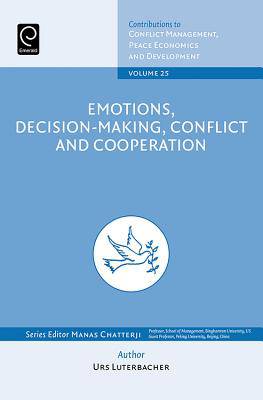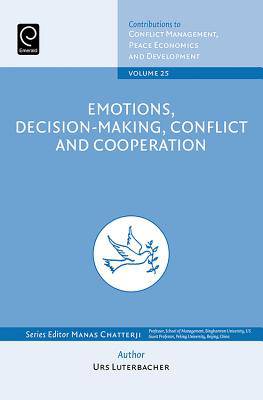
Je cadeautjes zeker op tijd in huis hebben voor de feestdagen? Kom langs in onze winkels en vind het perfecte geschenk!
- Afhalen na 1 uur in een winkel met voorraad
- Gratis thuislevering in België vanaf € 30
- Ruim aanbod met 7 miljoen producten
Je cadeautjes zeker op tijd in huis hebben voor de feestdagen? Kom langs in onze winkels en vind het perfecte geschenk!
- Afhalen na 1 uur in een winkel met voorraad
- Gratis thuislevering in België vanaf € 30
- Ruim aanbod met 7 miljoen producten
Zoeken
Emotions, Decision-Making, Conflict and Cooperation
€ 135,95
+ 271 punten
Omschrijving
The role of emotions is important in explaining conflicts and their resolution. Witness the emotions surrounding the outbreak of wars past and current and their endings. In order to introduce the perspective of emotions as an explanatory scheme of conflict escalation and crises, a comparison to classical conceptions such as the pursuit of power or commercial and financial interests is warranted. On first glance these two explanatory schemes seem to be at opposite extremes. However, new approaches to decision-making and rationality and challenges to the traditional expected utility model make these two conceptions much more compatible. The new perspective of rank dependent expected utility and the closely related notion of utility functions, which can both represent risk averse and risk preferring attitudes in decision-making go a long way in incorporating emotions within otherwise rational choices. One can thus build models that account more easily for conflict escalations but also for conflict resolution. These theoretical considerations are investigated within empirical cases of civil wars and shown to be effective in explaining the origins but also the breakdown of conflicts.
Specificaties
Betrokkenen
- Uitgeverij:
Inhoud
- Aantal bladzijden:
- 264
- Taal:
- Engels
- Reeks:
- Reeksnummer:
- nr. 25
Eigenschappen
- Productcode (EAN):
- 9781786350329
- Verschijningsdatum:
- 21/12/2016
- Uitvoering:
- Hardcover
- Formaat:
- Genaaid
- Afmetingen:
- 152 mm x 229 mm
- Gewicht:
- 521 g

Alleen bij Standaard Boekhandel
+ 271 punten op je klantenkaart van Standaard Boekhandel
Beoordelingen
We publiceren alleen reviews die voldoen aan de voorwaarden voor reviews. Bekijk onze voorwaarden voor reviews.








